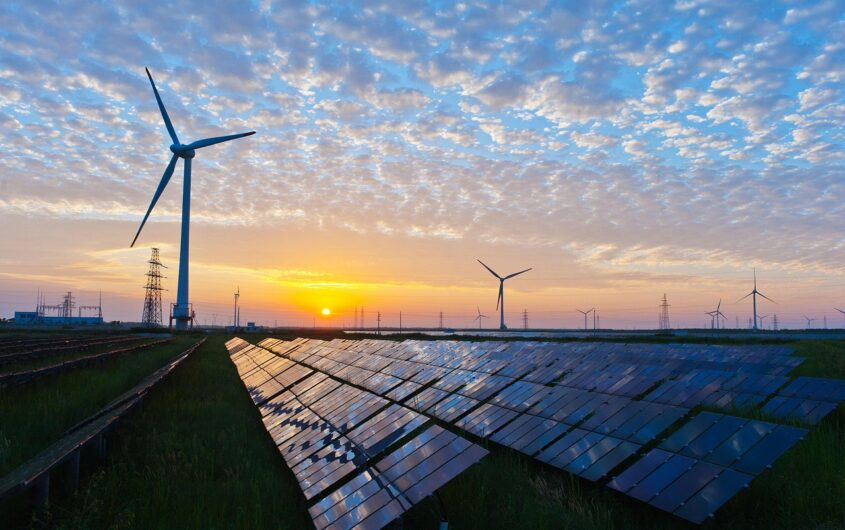
Kenueone via Pixabay
Turning Climate Protection into an Economic Success Story

Sonja Thielges
German Institute for International and Security Affairs (SWP)
Sonja Thielges is a Geoeconomics Non-Resident Fellow. She was a DAAD/AGI Research Fellow from mid-March to mid-May 2019 and explored foreign policy interests in Germany and the United States related to the countries’ energy transitions. In Germany, she is a researcher at the Research Cluster Climate Policy and Politics at the German Institute for International and Security Affairs (SWP) in Berlin. Her research interests include climate foreign policy, the global energy transition and industrial decarbonization. Her research has been published in studies, policy papers, online blogs, and academic publications.
Prior to SWP, Sonja was head of the Industrial Decarbonization research group at the Research Institute for Sustainability (RIFS, formerly Institute for Advanced Sustainability Studies, IASS) in Potsdam. She was a visiting researcher at the University of Michigan’s Center for Local, State, and Urban Policy in Ann Arbor in 2014 and previously also worked on projects at the Environmental Policy Research Centre (FFU), the Institut für Europäische Politik (IEP) Berlin, and the Centre International de Formation Européenne (CIFE). In 2017/2018, Sonja was a participant in the AGI project “A German-American Dialogue of the Next Generation: Global Responsibility, Joint Engagement,” sponsored by the Transatlantik-Programm der Bundesrepublik Deutschland aus Mitteln des European Recovery Program (ERP) des Bundesministeriums für Wirtschaft und Energie (BMWi). She completed an MA in North American Studies, Political Science, and Modern History at Freie Universität Berlin and Indiana University Bloomington and holds a PhD in political science from Freie Universität Berlin. Her PhD thesis studied climate policy discourses in the U.S. Rust Belt states.
Foreign policy challenges and opportunities for Germany and the EU
The Draghi Report of 2024 put the competitiveness of European industries high on the political agenda of European climate and industrial policy. The report underlines the challenges posed by slow economic and productivity growth in Europe and high dependence on energy and critical mineral imports. In an era of rising geopolitical tensions and the proliferation of unfair trade practices, Draghi identifies this as a risk for the success of the EU’s climate policy and decarbonization efforts. What the Draghi report implies is that the Energiewende and climate policy will not turn into an economic success story by themselves: they need to be supported by a robust political strategy—both domestically and at the foreign policy level.
The challenge of decarbonization for European industries
Since 2005, the EU has put a price on carbon for energy-intensive industries through its emission trading scheme (ETS). For industries highly exposed to trade, the ETS included free allocation of emission certificates to prevent carbon leakage and boost international competitiveness. With the introduction of the EU’s Carbon Border Adjustment Mechanism (CBAM), free allocation of certificates will, however, be phased out between 2026 and 2034 and will be replaced by a levy on imports of products with a higher carbon footprint than the comparable EU product. The EU Commission is currently considering both the extension of CBAM to further downstream products as well as a financial relief system for EU producers who export to international markets. Nevertheless, for manufacturers in the EU, this, now, more than ever, means that they must pursue both ambitious emission reductions in line with the EU’s climate targets and ensure the competitiveness of their products (e.g., “green” steel or electric vehicles) in international markets.
Trade measures such as CBAM play an important role in a foreign policy strategy to boost green industries. But CBAM is not enough: EU industries, and in particular German industries, are highly export-dependent. International demand for their “green” products, components, and technologies, however, is by no means a given: in most industries, it does not exist on a large scale yet—not in industrial countries, and certainly not in developing and emerging markets. Competition with conventional (fossil-based) products remains fierce; “green” industries are not an international norm yet. Creating “green” demand, which is an important building block in maintaining the competitiveness of European industries, therefore requires a policy strategy that goes beyond trade measures.
German climate policy: Culprit for de-industrialization or opportunity to boost competitiveness?
Meanwhile, at the national level in Germany, concerns not only about competitiveness but also about actual “de-industrialization” are rising. Some 100,000 manufacturing jobs were lost over the past year. Almost half of them were car industry jobs, which is particularly painful for a country that prides itself in its car industry. Although new jobs are created in areas such as healthcare and civil services, the loss of manufacturing jobs in not only big firms such as Volkswagen or Thyssenkrupp but also smaller firms in the German “Mittelstand” is highly problematic: they tend to be well-paid, unionized jobs; these companies invest large sums in research and development, and their taxes support smaller communities throughout the country. A recent poll finds that many manufacturers blame their problems on the Energiewende, the core of Germany’s climate policy. Since it is the manufacturing industries, in particular, that are both economically hard-hit and subject to the EU ETS, the notion is spreading that the climate transformation in Germany and the EU is not an industrial success and has, in fact, resulted in the “de-industrialization” trend.
This explanation is certainly an oversimplification, as it ignores the myriad of reasons for the manufacturing jobs losses: strong competition from heavily subsidized Chinese products in foreign markets and strategic misplanning on developments in the electric vehicle market in the auto industry, higher energy prices than elsewhere (which to a significant degree depend on natural gas prices), aggressive industrial policy in the United States, bureaucratic hurdles, a shortage of skilled labor, insufficient infrastructure, slow or uncertain demand in important export markets, and a trade war between China and the United States. Nevertheless, it is clear that policymakers need to address the above issues, and the new German government has made this one of its key tasks.
Departing from the narrative of de-industrialization, the new environmental minister, Carsten Schneider, promotes climate policy as an opportunity to boost industrial competitiveness. The coalition agreement between the Christian Democratic Union (CDU), Christian Social Union (CSU), and Social Democratic Party (SPD) also contains elements of (green) industrial policy with plans to introduce special electricity rates for manufacturers and speed up the hydrogen economy and permitting processes to boost (clean) industries.
The neglected foreign policy dimension of green industrial policy
In terms of the international dimension of green industrial policy, the German coalition agreement only mentions that it seeks to strengthen the Climate Club, a German-led G7 initiative which today has forty-six members and focuses on industry decarbonization.
The EU Commission responded to the challenges of industrial decarbonization with the publication of the Clean Industrial Deal in February of 2025. It contains a (short) international policy chapter, which identifies global markets and international partnerships, in particular Clean Trade and Investment Partnerships (CTIPs), as important business drivers for the clean industry transformation. In the CTIPs, the EU seeks to mobilize clean investment through Global Gateway, the EU’s global clean infrastructure strategy, to push for rules conducive to clean investment, and regulatory cooperation to support partner countries’ climate transformation.
As the biggest economy of the EU, Germany can play an important role in enhancing the foreign policy dimension of the Clean Industrial Deal beyond the Climate Club. It can do this through its own green industrial foreign policy and by building coalitions with other member states to push the topic at the EU level.
Elevating green industries as a foreign policy topic in Germany and the EU
Although explicitly mentioned as a focus of the previous German government’s Climate Foreign Policy Strategy, industry decarbonization in practice often remains rather implicit, especially in the country’s bilateral relations. Through programs and partnerships of the Economics Ministry (BMWE), the Development Ministry (BMZ), the Federal Foreign Office (AA), and the Environmental Ministry (BMUKN), Germany promotes various drivers of competitive clean industries in partner countries, including clean energy, circularity, energy efficiency, green hydrogen, and green skills. These industrial policy elements could be both strengthened and put more into explicit focus in Germany’s bilateral relationships, especially with developing and emerging economies. Jointly fostering clean industries could become an explicit goal of Germany’s partnership formats. This could also facilitate private sector investments in partner countries to expand the market for clean technologies and products. In the medium run, it could also serve to meet global development goals and diversify Germany’s trading partners.
These policy efforts to foster “green” markets abroad and steer green investments toward developing and emerging markets could be boosted further if the German government coordinates them well with the EU’s Global Gateway and with the activities of other EU member states. Germany could, furthermore, work on building new coalitions with other EU members such as France and Italy to elevate the foreign policy dimension of the Clean Industrial Deal, including topics such as Carbon Capture and Storage (CCS) and Utilization (CCU) on the foreign policy agenda. And, finally, it could work to include more EU members in the Climate Club to strengthen the initiative and signal the importance green industries have to the EU and its member states.








